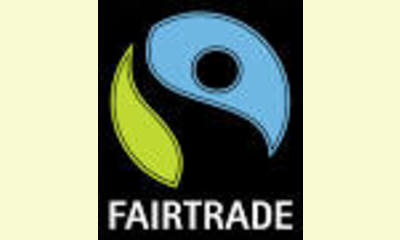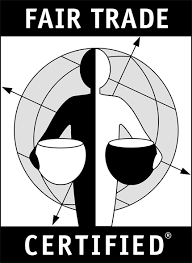|
|
Fair Trade Awareness Month in Ohio
an article by Randy Wilson
Video: Fair Trade
This October marks the 9th annual Fair Trade
Awareness month. Here in Ohio, there are several
efforts to expand awareness and access to Fair
Trade throughout the state. Fair Trade is a way to
think globally and act locally, by buying items
that we know that they were made by workers and
farmers that were paid fairly for their work. Fair
Trade means that the people who produce the items
aren't being held in slave labor and a fair wage
gives them the ability to invest in their
communities, to rise up out of poverty and secure
a better future for their families. As Ohioans,
Fair Trade aligns with our values to respect one
another and to value the work of ourselves and
others.

New Fair Trade Logo
click on photo to enlarge
On August 9th, 2013, Dayton was certified as the
2nd Fair Trade Town in Ohio! We tracked where Fair
Trade items could be found throughout the city, in
stores and even schools that sold fair trade
chocolate as a fundraiser or churches that served
fair trace coffee. We worked with other
organizations and businesses to discuss where they
could obtain fair trade products to use or sell.
In schools, we are working with students and
teachers to source fair trade items, like t-shirts
for events and have conversations with
administrators to change policies. The city of
Dayton also passed a great
resolution supporting Fair Trade on August
2nd, 2013. You can find more info about our work
in Dayton, including our efforts to make
Montgomery County the first Fair Trade County at
Peace on Fifth or on Fac
ebook to see how you can get involved.
In the Cleveland area, there will be an Ohio Fair Trade
Expo on October 12, 2013 to bring together
community members from throughout the state,
vendors and organizations to learn about Fair
Trade options and how to increase access to these
items locally.
Do you want your town to be a Fair Trade Town? Check
out Fair
Trade Towns USA.
Look for these logos on Fair Trade items:
New Fair Trade Logo - see above.
Older Fair Trade Logo - following:

You can find more info on Fair Trade here:
Fair
Trade.net
Fair Trade Federation
|








|
DISCUSSION
Question(s) related to this article:
How can we get to a sustainable, peaceful economy?,
* * * * *
LATEST READER COMMENT:
Annie Leonard: How to Be More than a Mindful Consumer
The way we make and use stuff is harming the world—and ourselves. To create a system that works, we can't just use our purchasing power. We must turn it into citizen power.
by Annie Leonard
posted Aug 22, 2013
Stuff activist Annie Leonard: “Consumerism, even when it tries to embrace ‘sustainable’ products, is a set of values that teaches us to define ourselves, communicate our identity, and seek meaning through accumulation of stuff, rather than through our values and activities and our community.” YES! photo by Lane Hartwell.
Since I released "The Story of Stuff" six years ago, the most frequent snarky remark I get from people trying to take me down a notch is about my own stuff: Don't you drive a car? What about your computer and your cellphone? What about your books? (To the last one, I answer that the book was printed on paper made from trash, not trees, but that doesn't stop them from smiling smugly at having exposed me as a materialistic hypocrite. Gotcha!)
Let me say it clearly: I'm neither for nor against stuff. I like stuff if it's well-made, honestly marketed, used for a long time, and at the end of its life recycled in a way that doesn't trash the planet, poison people, or exploit workers. Our stuff should not be artifacts of indulgence and disposability, like toys that are forgotten 15 minutes after the wrapping comes off, but things that are both practical and meaningful. British philosopher William Morris said it best: "Have nothing in your house that you do not know to be useful or believe to be beautiful."
Too many T-shirts
The life cycle of a simple cotton T-shirt—worldwide, 4 billion are made, sold, and discarded each year—knits together a chain of seemingly intractable problems, from the elusive definition of sustainable agriculture to the greed and classism of fashion marketing.
The story of a T-shirt not only gives us insight into the complexity of our relationship with even the simplest stuff; it also demonstrates why consumer activism—boycotting or avoiding products that don’t meet our personal standards for sustainability and fairness—will never be enough to bring about real and lasting change. Like a vast Venn diagram covering the entire planet, the environmental and social impacts of cheap T-shirts overlap and intersect on many layers, making it impossible to fix one without addressing the others.
I confess that my T-shirt drawer is so full it's hard to close. . ...more.

|
|









